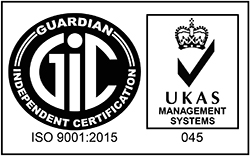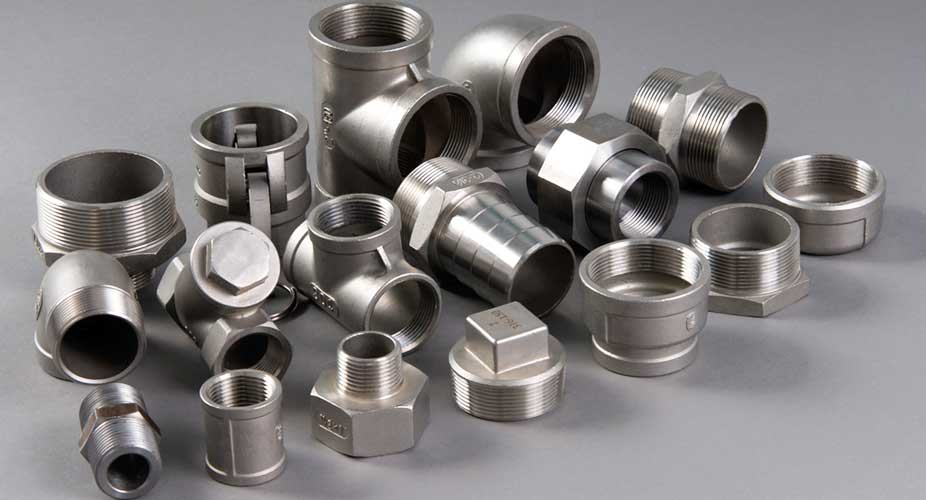
Pipe fittings material selection considers factors like fluid type, temperature, pressure, and environmental conditions. Common materials include stainless steel for corrosion resistance, carbon steel for strength, and PVC for versatility. Selection involves balancing performance, cost, and compatibility with the piping system, ensuring durability and safety. Proper material choice enhances reliability and longevity, minimizing maintenance and replacement costs in industrial applications.
Pipe Fitting Material Selection: Establishing the Base for Dependable Systems
In the intricate world of plumbing and industrial piping, fitting selection is more than just a choice; This is a strategic decision that significantly affects system performance, durability, and efficiency. Among the myriad factors contributing to a fitting’s reliability, material selection stands as a cornerstone determinant.
RECOGNIZING THE IMPORTANCE OF MATERIAL CHOICE
Although the sheer variety of materials for pipe fittings can be daunting, they also provide a range of qualities and attributes that meet different demands. The type of fluid being conveyed, the temperature and pressure levels, corrosion resistance, and financial limitations are all important considerations when choosing the right material.
COMMON MATERIALS AND THEIR ATTRIBUTES
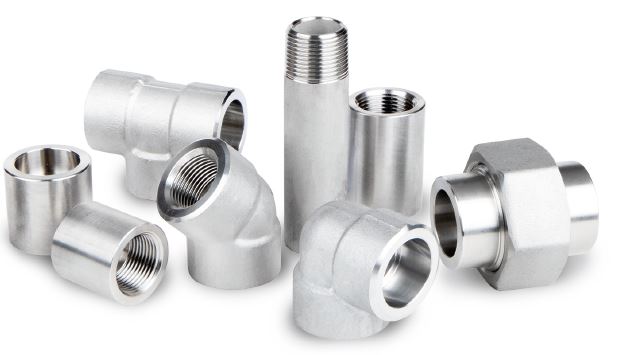
Stainless Steel: Known for its corrosion resistance and strength, stainless steel fittings are a preferred choice for a wide range of applications. They exhibit remarkable durability and maintain integrity even in harsh environments, making them suitable for various industries, including chemical processing and food production.
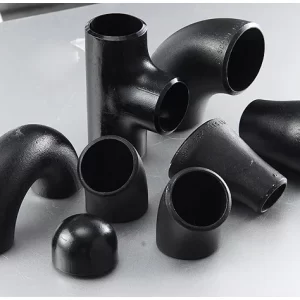
Carbon Steel: Renowned for its robustness, affordability, and ability to withstand high-pressure scenarios. Carbon steel fittings are prevalent in industrial pipeline system, especially in applications involving water, oil, and gas transportation.
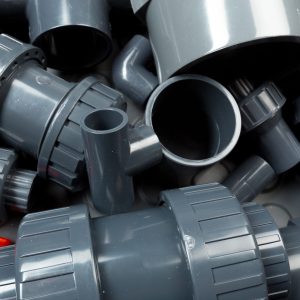
PVC (Polyvinyl Chloride): PVC fittings are prized for their versatility, cost-effectiveness, and resistance to chemical corrosion. Commonly used in plumbing, irrigation, and low-pressure systems, they offer ease of installation and excellent performance in non-demanding environments.
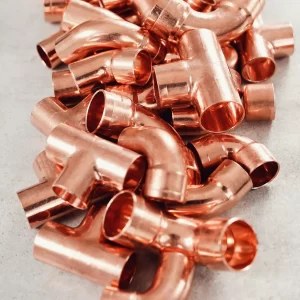
Copper: With its superb thermal conductivity and resistance to corrosion, copper fittings find utility in plumbing systems for both residential and commercial purposes. They are particularly favoured for their reliability in potable water distribution.
SELECTING THE IDEAL MATERIAL: KEY CONSIDERATIONS
Operating Conditions: Assessing the temperature, pressure, and nature of the transported fluids is paramount. Certain materials excel in high-temperature environments, while others offer superior resistance to corrosive substances.
Corrosion Resistance: It’s important to know how susceptible a material is to corrosion, particularly in fields that work with chemicals, acids, or seawater. Choosing materials that are resistant to corrosion guarantees durability and dependability throughout time.
Cost Efficiency: Balancing the initial cost of materials with long-term maintenance and replacement expenses is essential. Sometimes, investing in a more durable material upfront can lead to cost savings in the long run.
CONCLUSION
In the world of pipe fittings, material selection is a decision that affects the entire system life cycle. Engineers and system designers can make informed choices by evaluating the specific needs of their application and considering factors such as operating conditions, corrosion resistance, and cost efficiency.
Each material has its own unique advantages and limitations. Therefore, a comprehensive understanding of these materials helps to build strong, efficient and long-lasting duct systems to meet the needs of modern industrial and residential applications.
Product Tags
Forged Fittings Types | ||
Type | Elbow Fittings | 45, 90 Degree Threaded and Socket Weld |
Tee Fittings | Equal and Reducing, Threaded and Socket Weld | |
Nipple Fittings | Hex Head and Reducing | |
Plug Fittings | Hex Head, Round Head & Square Head | |
Coupling Fittings | Full, Half, Reducing, Threaded and Socket Weld | |
Cap Fittings | Threaded and Socket Weld | |
Bushing Fittings | Hexagon, Reducing, Flush | |
Union Fittings | Threaded and Socket Weld | |
Cross Fittings | Threaded and Socket Weld | |
Branch Fittings | Reinforced Socket Outlet | |
Size Range | 1/4" (8mm), 3/8" (10mm), 1/2" (15mm), 3/4" (20mm), 1" (25mm), 1-1/4" (32mm), 1-1/2" (40mm), 2" (50mm), 2-1/2" (65mm), 3" (80mm), 4" (100mm) | |
Standard | ASME/ANSI 16.11, BS3799, BS1740, MSS SP-83, SP95, SP97 | |
Class | 3000#, 6000#, 9000# | |
Thread | NPT (ASME/ANSI B120-1), BSP, BSPT | |
Specification | |
Carbon Steel | ASME/ASTM SA/A105N |
High Yield Carbon Steel | ASTM A694 F42/ 46/ 52/ 60/ 65/ 70 |
Low Temp Carbon Steel | ASME/ASTM SA/A350 LF1/ 2/ 3/ 6 |
Chrome Moly | ASME/ASTM SA/A182 F2, F5, F9, F11, F12, F22, F91 |
Stainless Steel | ASME/ASTM SA/A182F304/304L, 316/316L, 309, 310, 304H, 310H, 317/317L, 321, 321H, 347, 347H, 904L |
Duplex/ Super Duplex | UNS S31803, S32205, S32750, S32760 |
Nickel Alloy | ASME/ASTM SB564, |
Remark | HIC, PED 2014/68/EU, NACE MR0175, NORSOK available |
Looking for flanges, fittings, pipes, valves and gasket?
Saliran Group has over 10 years of experiences in trading of a wide range of flanges, pipes, valves, fittings, gasket and related parts and accessories (“PVF products”) as well as steel products with numerous happy customers all around the world. We supply a variety of gaskets either in metal, non-metal as well as food-grade approval available material.
Click on the link below to contact us now!

